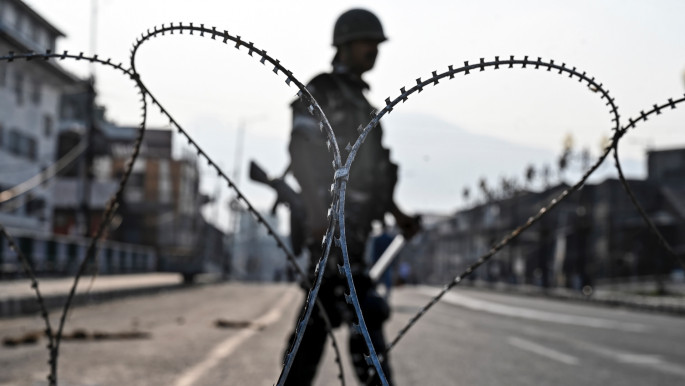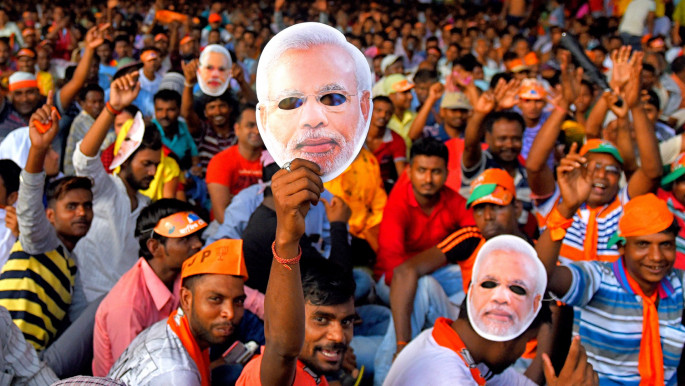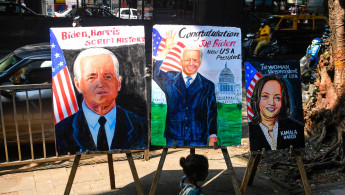Will the Biden-Harris administration stand up to Modi on Kashmir?
Expressing disappointment, Biden wanted India to take the necessary steps to restore the rights of the people of Kashmir. Condemning both the recent moves, Biden considered them "inconsistent with the country's long tradition of secularism and with sustaining a multi-ethnic and multi-religious democracy."
Clearly laid out in a recent policy paper entitled 'Joe Biden's agenda for Muslim American communities', the President-elect's views seem to suggest that his government would take a more proactive approach to Kashmir than Donald Trump.
Not only that, the policy document lumped together the Kashmir and Assam issues in India with the forced detention of nearly one million Uighur Muslims in western China and atrocities against the Rohingya Muslim minority in Myanmar.
Having done away with the special status of the Kashmir valley under Article 370 of the constitution, India had divided the disputed region into two separate Union territories of Ladakh and Jammu and Kashmir on 5 August last year.
 |
Joe Biden and Kamala Harris called for better democratic norms and more secular policies in India during the run-up to US presidential elections |  |
Defending its actions, New Delhi calls the change of status in Kashmir an "internal matter." In addition, the new citizenship law facilitated followers of all religious faiths, except Islam, to obtain Indian citizenship. Seeking to drown out criticism, the Modi government then forced the closure of Amnesty International branches in India.
According to Aakar Patel, the former head of Amnesty International India, "Biden's win has come on the back of a Democratic party that has been very supportive of human rights within US and lot of the people who are now rising stars in the party have an interest in the rights situation in India".
 |
|
| Read more: 'Another Palestine': Kashmiris fear demographic change under India's new domicile law |
Welcoming the Biden-Harris win, all political parties in Kashmir have now pinned their hopes on the new government - and they have great expectations. But realistically, the US cannot go beyond a certain line, with US-India ties burgeoning in recent years due to an upgrade in military and strategic relations with New Delhi.
Firstly, having enjoyed a close relationship with PM Narendra Modi, President Trump took relations with India to a new high. As a result, the US government mostly ignored the deteriorating situation in Kashmir, even though it revoked the valley's constitutionally mandated autonomy. And now it seems like even the new administration would like to consolidate its relationship with India.
In an op-ed penned just a week before the US elections, Biden wrote, "The U.S. and India will stand together against terrorism in all its forms and work together to promote a region of peace and stability where neither China nor any other country threatens its neighbors." So what options are left for Washington vis-a-vis Kashmir?
Talking with The New Arab, Michael Kugelman, deputy director of the Asia program at the US-based Wilson Center, observed that a Biden win "does not mean all that much for India's position on Kashmir".
 |
Under Trump, the US government mostly ignored the deteriorating situation in Kashmir |  |
Explaining why, he says, "I don't expect any major change in US policy, which has largely been a hands-off position. But I do expect Biden's administration to press India on rights issues in Kashmir. Even modest pressure would be notable, given that the world tends to give India a pass on these issues."
He also expects that any criticism would be delivered privately, saying, "If there are any public comments on it from the White House, they will be fairly restrained and subtle. Biden's old boss, Barack Obama, made a speech in Delhi in 2015 in which he gently called India out on its religious freedom record. That type of tone is what we could expect from the Biden administration if there are any public comments on the Kashmir issue."
Secondly, a complicated 'China factor' also comes into play. Washington would prefer to remain neutral on Kashmir as Sino-US relations continue on a downward trajectory and it needs New Delhi's support. If it takes any significant steps, like pressing for a referendum in the valley, its ties with India may rupture.
 |
|
| Read more: India's 'Love Jihad' law: The BJP's latest weapon against Muslims |
In recent years, even as trade ties deteriorated between the US and China, three agreements for closer military cooperation were inked with New Delhi. However, when border frictions started between India and China, becoming particularly serious in 2020, the US stayed away from the spat.
Therefore, it is quite possible that the Biden administration might even improve ties with China. If that happens, India might lose some leverage.
Though both Trump and Biden consider Sino-US relations challenging, their modi operandi are different, which is why James Crabtree, associate fellow at the Asia-Pacific program of Chatham House is of the opinion that, "If American policy ends up going slightly easier on China than Trump did, and going after Russia, then that complicates India's position."
 |
You're not going to have the Biden administration try to delve into the dispute itself - just the rights concerns that emanate from India's oppressive actions there |  |
Thirdly, another new angle is that the new VP-elect Kamala Harris has Indian roots. And understandably, the Indian government expects even more warmth in ties. PM Modi recently sent special greetings to Harris, telling her he felt "immense pride" over her success.
Apparently, the Indian government expects her to have a softer touch, hoping that this could boost New Delhi's terms with Washington. However, where the Kashmir matter is concerned, Harris has voiced her support quite bluntly, saying that, "We have to remind Kashmiris that they are not alone in the world. There is a need to intervene if the situation demands."
But again, the new administration cannot do much on Kashmir, for the near future at least. As Kugelman has suggested, "Biden's best option is to take up the issue privately, and on a sustained level. He could place it in the broader context of strengthening democracy and human rights, one of his big foreign policy campaign slogans. Of course, taking it up in this way does not mean that India will make changes to its policy. But it would certainly be a wake-up call to an Indian government that isn't used to such pressure from Washington."
 |
|
| Read more: How India and China's border face-off could change the contours of Kashmir's conflict |
Finally, another factor is financial. The Indian economy has shrunk by 23.9 percent in the first quarter of the 2020-2021 fiscal year because of the coronavirus pandemic. At this point, India's business relationship with the US has become even more crucial, with Washington New Delhi's biggest trade partner and annual bilateral trade valued at nearly $90 billion.
However, it remains to be seen to what extent the US will change its stance on the Kashmir issue. According to C Raja Mohan, the director of the Institute of South Asian Studies at the National University of Singapore, Biden is more familiar with the history of US-Pakistan relations than his recent predecessors.
As a long-term Senator and Vice-President, Biden has been engaged with Pakistan-related issues for many years and even received Pakistan's second highest civilian honour - the Hilal-e-Imtiaz (Crescent of Excellence) - in 2008. By the same token, Biden knows the intricacies of the Kashmir issue and Islamabad's stance quite well.
But for now, he might just focus on human rights or religious freedom. "It bears noting that even if Biden and other senior officials in his administration do bring up Kashmir with their interlocuters in Delhi, they will focus on rights issues, and not on territorial or legal issues," Kugelman says.
"You're not going to have the Biden administration try to delve into the dispute itself - just the rights concerns that emanate from India's oppressive actions there."
Sabena Siddiqui is a foreign affairs journalist, lawyer and geopolitical analyst specialising in modern China, the Belt and Road Initiative, Middle East and South Asia.
Follow her on Twitter: @sabena_siddiqi



